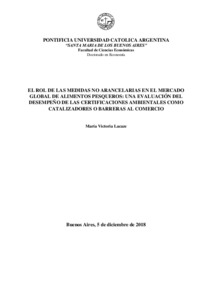Por favor, use este identificador para citar o enlazar este ítem:
https://repositorio.uca.edu.ar/handle/123456789/14669| Campo DC | Valor | Lengua/Idioma |
|---|---|---|
| dc.contributor.advisor | Melo Contreras, Oscar | es |
| dc.contributor.advisor | Sabbioni Pérez, Guillermo | es |
| dc.contributor.author | Lacaze, María Victoria | es |
| dc.date.accessioned | 2022-08-18T12:33:19Z | - |
| dc.date.available | 2022-08-18T12:33:19Z | - |
| dc.date.issued | 2018 | - |
| dc.identifier.citation | Lacaze, M.V. El rol de las medidas no arancelarias en el mercado global de alimentos pesqueros: una evaluación del desempeño de las certificaciones ambientales como catalizadores o barreras al comercio [en línea]. Tesis Doctoral. Pontificia Universidad Católica Argentina, 2018 Disponible en: https://repositorio.uca.edu.ar/handle/123456789/14669 | es |
| dc.identifier.uri | https://repositorio.uca.edu.ar/handle/123456789/14669 | - |
| dc.description.abstract | Abstract: Sustainability labelling-schemes for marine fisheries are taking a prominent position in the supply chain governance of an increasingly globalised seafood market. These mechanisms can stimulate commercial exchange if their adoption facilitates access to export destinations or they can operate as non-tariff measures, reducing trade. It has recently been argued that the market for certified sustainable seafood remains a Northern affair. This argument leads to the crucial questions of who is benefiting from eco-labels and what is their impact on developing countries. To the best of our knowledge, no econometric analysis on their performance as catalysts or barriers to trade has yet been conducted. Using a unique dataset that accounts for eighty percent of world seafood flows built specially for this study and based on UN Monthly Comtrade (2010-2014), this research offers empirical evidence of the effects of eco-labels on seafood trade. The estimation of a structural gravity model at product level is augmented with the addition of an eco-label presence variable. This variable is interpreted as a preference parameter, if the process of differentiation stimulates trade flows, or as a trade cost, if trade flows decrease, thus acting as a non-tariff measure. Results from the estimation of the Poisson pseudo-maximum likelihood multiplicative estimator reveals that the effect of an eco-label is significant in statistical terms and positive for every product. This result is the first available evidence that eco-labels operate as a catalyst of seafood trade. | es |
| dc.format | application/pdf | es |
| dc.language.iso | spa | es |
| dc.rights | Acceso abierto | * |
| dc.rights.uri | http://creativecommons.org/licenses/by-nc-sa/4.0/ | * |
| dc.source | Tesis Doctoral. Pontificia Universidad Católica Argentina, 2018 | es |
| dc.subject | PESCA COMERCIAL | es |
| dc.subject | COMERCIO INTERNACIONAL | es |
| dc.subject | BARRERAS COMERCIALES | es |
| dc.subject | CERTIFICACION | es |
| dc.subject | MEDIO AMBIENTE | es |
| dc.title | El rol de las medidas no arancelarias en el mercado global de alimentos pesqueros: una evaluación del desempeño de las certificaciones ambientales como catalizadores o barreras al comercio | es |
| dc.type | Tesis doctoral | es |
| uca.disciplina | ECONOMIA | es |
| uca.issnrd | 1 | es |
| uca.affiliation | Fil: Lacaze, María Victoria. Pontificia Universidad Católica Argentina. Facultad de Ciencias Económica; Argentina | es |
| uca.affiliation | Fil: Melo Contreras, Oscar. Universidad Católica de Córdoba; Argentina | es |
| uca.affiliation | Fil: Sabbioni Pérez, Guillermo. Pontificia Universidad Católica Argentina. Facultad de Ciencias Económica; Argentina | es |
| uca.version | publishedVersion | es |
| item.grantfulltext | open | - |
| item.fulltext | With Fulltext | - |
| item.languageiso639-1 | es | - |
| Aparece en las colecciones: | Tesis de Doctorado en Economía | |
Ficheros en este ítem:
| Fichero | Descripción | Tamaño | Formato | |
|---|---|---|---|---|
| rol-medidas-no-arancelarias.pdf | 2,38 MB | Adobe PDF |  Visualizar/Abrir |
Visualizaciones de página(s)
120
comprobado en 27-abr-2024
Descarga(s)
54
comprobado en 27-abr-2024
Google ScholarTM
Ver en Google Scholar
Este ítem está sujeto a una Licencia Creative Commons

